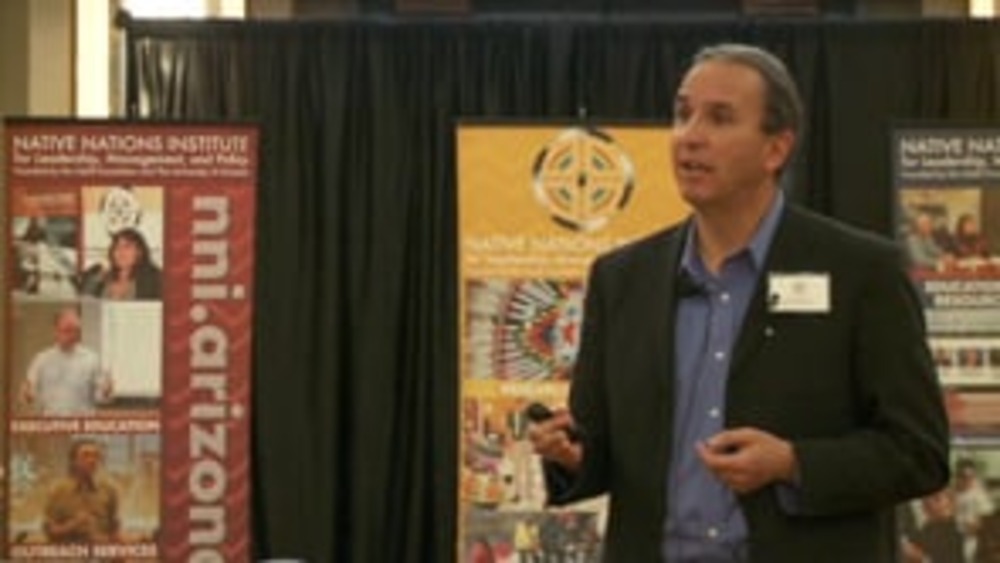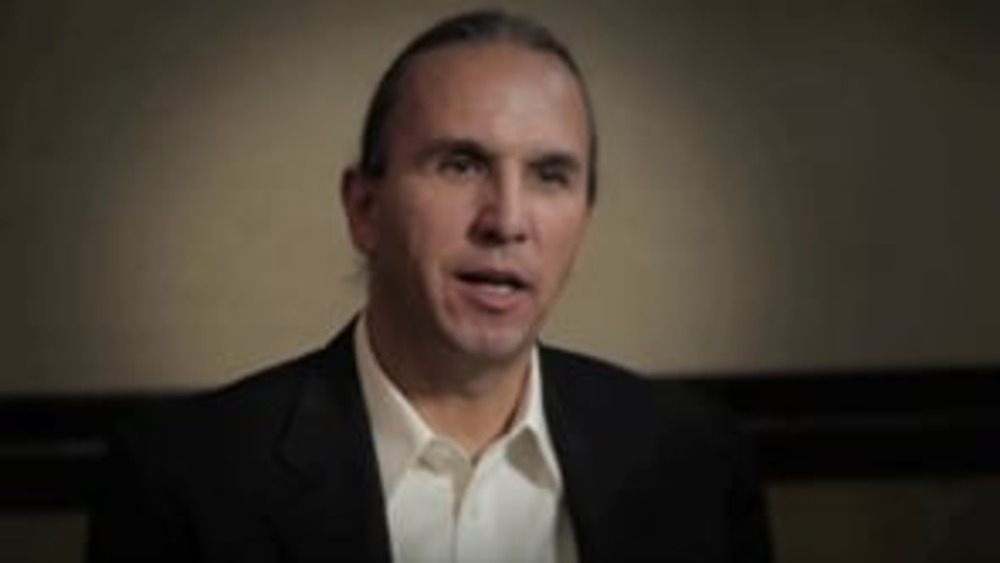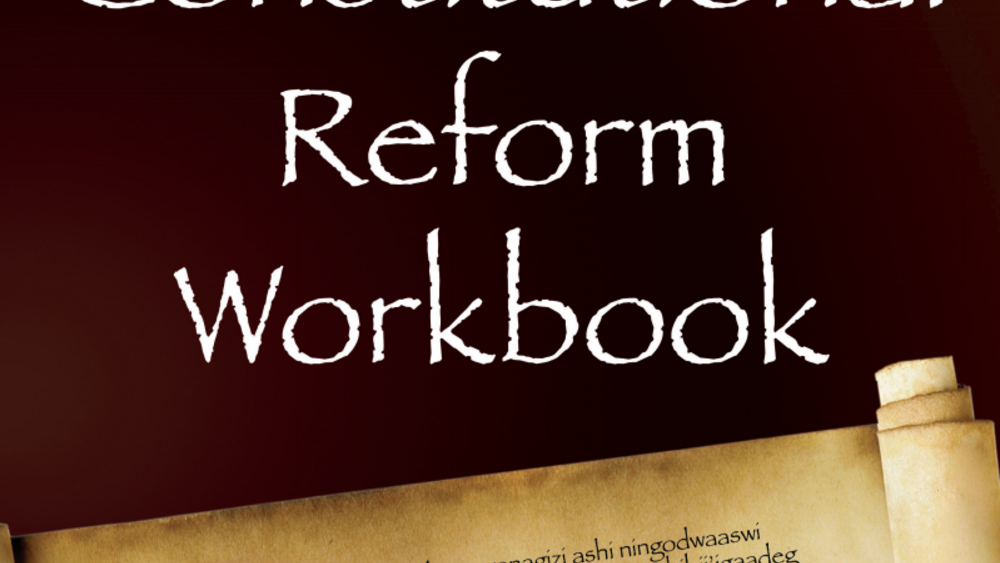Terry Janis, former Project Manager for the White Earth Constitution Reform Project, fields questions from the audience about his specific role in White Earth's constitutional reform process. He stresses the need for those engaging in constitutional reform to be cognizant of the fact that a process involving foundational change will necessarily entail Native nations citizens to confront and deal with the enduring legacies of colonial federal policies.
Additional Information
Janis, Terry. "Citizen Engagement and Constitutional Change at the White Earth Nation (Q&A)." Tribal Constitutions seminar, Native Nations Institute for Leadership, Management, and Policy, University of Arizona. Tucson, Arizona. April 2, 2014. Q&A session.
Transcript
Audience member:
"Okay, to develop this, I guess this governance model because we've been at this for awhile now and we got our... Let me take you back. It first started, we tried to go to self-government, that was shot down; people were scared of that. Our land code, people were scared of that; that went down. But we got our own election code and that's what the people passed and membership code. I guess how I see it is you gave us all this information how to govern ourselves, the whats and ifs, what if this happens, what if that or whatever, all the unknowns. Maybe it was too much for our people to give them all that at once. Now we have a problem of backlog of over 400 and some odd homes, some houses are boarded up and need renovation and so it boils up dollars.
So let's say if we develop a model and this is important what you're talking about on communication, that's important. With that same concept, if we've already got our election code and membership code, now let's develop the housing code because we have a problem, we pay rent. Nobody understands that money goes back into their homes and whatever to develop and all. Nobody likes paying rent. They think everything's free. So we have a problem of collecting rent. If we develop this model, let's say just for the housing area to start off, develop this kind of model, bring it out to the people, not evictions, whatever might work.
So is there processes like that that'll slowly sort of keep the whole picture into the... To me, the way I look at it is, there's too much, they can't digest all that. So bit-by-bit, I guess that's how I'm looking at it. Now what we're talking about here is just the housing part of it. We've got our own education, hopefully we develop that. At least in this term, at least we can push something, working with... It's a process to make it work, at least we're going someplace instead of taking a step back all the time. I'm trying to look for solutions I guess."
Terry Janis:
"I don't know if this is on, but can you hear me okay? In every situation you have to deal with the reality of two issues, one of which is our colonization. And we as Indian people have a colonized mentality, regardless of whether we realize it or not and when we're talking about change, we have to accept that. So we are a colonized people and change in that sense is going to be difficult to accomplish. And as people that are moving our communities towards change, whether it's a broad constitution or a specific code, that's got to be part of the educational process is accepting our people for who they are and where they're at. There's beauty in our people and because of the history of what we suffered there's also darkness. And when we're thinking about how we're informing and how we're educating our people, we have to keep in mind the colonized mindsets that our people have and are we going to engage that because we have to engage it, otherwise it'll kick us in the ass. It'll stop things from moving forward. And the reality is, it's only going to be able to move forward as far as it can. Sometimes you have to take a staged process. So that's one thing.
And the second thing I spent a lot of time with earlier is just the politics of our community. Anytime you're talking about change and you're talking about an informational, educational process the politics of the community are very real and you have to deal with that. I didn't mention earlier the kind of colonized reality or colonized mindsets because it's sometimes difficult to really accept about ourselves. But...and it's not always the best strategy to say it directly, but you see it over and over and it's a part of the reality of who we are as Indian people. It's how we grew up. We have certain ideas.
My dad growing up on Pine Ridge, the idea was that him as a landowner is he was completely free; he could never be regulated, he could never be taxed, he could do what he wanted with his land. That's what it meant to be Indian on a reservation. And the reality is that's just not true at all. We as Indian people are regulated and managed and controlled more than any other people on the country, my dad included. And if the tribe wants to move forward and start to assert its sovereign authority by zoning and regulating and taxing and doing other things with their property, they're going to do that at some point. But that's our reality and the colonized mindset comes from what happened to us as Indian people, but also the unique sort of situation that we live in, what we've gotten used to, the things that we think we can do and that are inherent, but oftentimes are just circumstantial. For my dad, it's just because the tribe hasn't chosen to regulate their tax yet and that's all that is.
But I agree with you completely. Thinking through, knowing your own people, how best to achieve change, how best to inform and educate your people about that process, maybe a staged sort of process is the best way, maybe a broad complete reform-like what White Earth did is the best way. You're in the best situation to make that decision but it's a decision you have to make. You have to make that decision. It's tactical, it's strategic and you're responsible for it. As leaders, you are responsible for making that decision, period. And you'll live or die on that. Sometimes it'll be the wrong decision and then it'll all fall apart, but that's your job and that's what you do."
Herminia Frias:
"Another question...do we have a question on this side? Okay, question over here. Oh, I'm sorry. Ms. Porter did you want to respond?"
Jennifer Porter:
"Oh, no."
Audience member:
"Okay, so I have a question for you, Terry. So you mentioned maintaining a firm principle of neutrality. That's really interesting and I suspect I'm probably not the only one thinking this, but as you noted, as a Lakota person working up with Ojibwe people, it's really difficult for me to imagine that, one being a Diné, I cannot imagine Navajo, in this case we have a constitution, but a Navajo government development person who is basically in charge of putting together a reform or a government that is one for either Comanche or worse case with the Ute, speaking from that role. So referring to that again what I'm saying is I commend you White Earth Nation and you for doing that. Getting to the question is the neutrality piece to it. We all come with our values, our perceptions, our thoughts. I can't help but think that at some point during this process that you sort of like wanted to nudge folks in one way or another on some of your own issues with respect to one being an attorney and having a good understanding of federal Indian law in relation to Indian Country. I just wanted to ask how do you handle something like that?"
Terry Janis:
"Yeah, yeah. There's two answers to that. The first is that in this particular issue, this idea of neutrality, it only focuses on the educational and informational process. The whole drafting of a constitution or an amendment to a constitution, you cannot be neutral on that. You're going to make decisions and you're going to compromise and it's going to be one way or another and that's the work that tribal members really need to be doing I think. So as far as your own governmental reform, actually drafting the reforms, actually thinking them through, I think the very nature of that is positional and political and about compromise. For me the neutrality thing was important from an educational perspective, strictly in getting information out there, educating, helping people to understand, answering their questions. When they're completely wrong about something, fighting with them about that. That's the only time I took a position. When they were wrong about what they were saying about what this proposed constitution said, then I fought about that because I just wanted them to get it right. I don't want...that didn't decide for them one way or the other, I just wanted their information to be accurate, that they learned the materials and I got into plenty of fights, I had plenty of fun on that. The reason why we go to law school is we kind of like fighting a little bit, right? And so you get into plenty of fights and you have plenty of fun with that, but that neutrality position is really directly tied to the educational and informational process as a community-based thing. This is community-based work. This is going into people's house, this is personal, this is physical, this is live; you've got to be comfortable with that. You've got to get educators and people that are a part of your community training and information thing that are comfortable with that kind of arrrgh. It's a beautiful thing and it's really fun if that's what you enjoy and that's what you love as an educator and that's... So no, I never really compromised in that sense. I didn't really have a struggle with that ever."
Herminia Frias:
"We have time for one more question and just to let you know, we're going to continue this conversation after lunch. Ian Record is going to be continuing this on citizen engagement. So Robert, you'll have the last question before lunch and if you have more questions, we'll open it up again after lunch."
Robert Hershey:
"Thank you and thank you very, very much for the presentations. In response to the gentleman from Canada, I was going to talk about this in my presentation later, but let me just say really the idea of big bites versus small bites. And there are a number of constitutions, like you talked about housing, well, the Tohono O'odham have a constitution that has a lot of power reserved to the districts. The districts are responsible for home site, land site assignments. The way the Navajos constructed land site assignments through matrilineal. The Hopi, the villages have independent authority in many regards and things are specifically reserved. So by working on these different codes, your election code, your education or whatever, it might be your housing, you are actually then having the discussions, which will then transform themselves when the time comes into writing themselves as constitutional amendments. So you are basically in the process of creating constitutions by virtue of your actual practices in these different areas."
Herminia Frias:
"Thank you, Robert. And I'd like to thank both of the panelists for sharing their stories. Thank you very much. Give them a round of applause."



